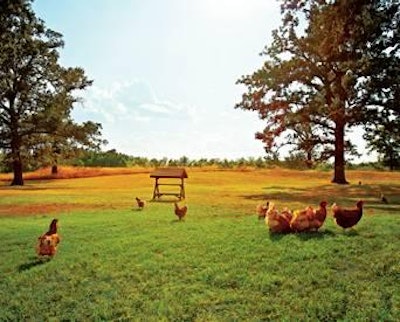
The happy egg co., a free-range brand of the U.K.’s egg and dessert business Noble Foods, has achieved considerable impact on its home market since it was launched in 2009. The brand’s success now appears to be replicated by Noble overseas. Keeping abreast of consumer and regulatory changes has worked well for Noble, which has a GBP595 million (US$1 billion) turnover and delivers 72 million eggs a week in its home market.
Doing things differently
The happy egg co. claims “to do things differently.” It does not stop at giving its free-range hens the freedom to roam, but “does everything in its power to make its farms truly happy places.” This includes planting trees on at least 10 percent of the range – to date 680,000 trees - and including “activity kits” and sandboxes and ensuring all farms are thoroughly audited. Currently, there are around 100 farms in the U.K. that supply it with eggs, with an average flock size of 5,000-6,000.
Alongside this care for birds, the happy egg co. runs a strong marketing campaign to ensure that consumers know exactly how its birds are reared, and in 2011, the offering won the Grocer Food Brand of the Year. The initiative has worked well with U.K. consumers. Free-range eggs now account for half the eggs sold in the U.K., with Noble being a major supplier, and this share is expected to keep on growing.
Brand extension
The happy egg co. brand is now being extended, and in April this year its organic offering entered supermarket chain Asda, before being launched in Tesco and Morrisons.
The company notes: “We already know from years of experience that happier hens lay tastier eggs and it follows that happier hens fed organically lay tastier organic eggs so this is a natural progression for our brand. We aim to offer our consumers as much choice as possible.
“We are very excited to be able to offer happy egg organic to those who are looking for an organic option.”
Three farms are now supplying the company with eggs from hens that are kept to the same welfare standards, but reared on an organic diet free from genetic modification. While all of Noble’s farms are subject to internal and external audits, its organic range is subject to additional auditing to achieve certification.
The expansion of the company’s organic offering is, perhaps, a bold move as the U.K. market for organic eggs in the year to the end of March 2014 declined by 0.6 in value and by 4.9 percent in volume. However, looking longer term, demand is expected to turn positive and outperform growth in demand for cage, barn and free-range eggs. If the company achieves its expected success with the line, the number of farms producing organic eggs will be increased.
Overseas expansion
The happy egg co. has been making its presence increasingly felt in the U.S. It entered the market in 2012, and this year announced that it is selling more than 1 million dozen eggs there.
Free range may still be a niche market in the U.S. – of the 90 billion eggs produced there each year, 95 percent come from caged birds, but consumer attitudes are changing. As has occurred in Europe, the U.S. is going through its own re-assessment of how laying hens should be kept, and Noble would appear to be benefiting from its home market experience in its new overseas operations, and will be well placed to benefit from any regulatory change.
David Wagstaff, chief operating officer of the happy egg co. in America, says: “The specialty egg market, which includes free range, is now predicted to grow by 15 percent per year-on-year, with cage-free now accounting for 4 percent of the total U.S. egg market.”
By the beginning of last year, the company had 75,000 hens on lay in Arkansas and Missouri and an additional 75,000 pullets being raised. The farms are family owned and produce under contract to strict specifications. Their location gives the happy egg co. a good central point for distribution and provides a suitable climate for year-round outdoor access.
An egg is an egg is an egg
Branding has certainly allowed the range to stand out. For example, last Christmas the happy egg co. produced special boxes with a seasonal message that contained “Snowy White Eggs,” as the UK is a predominantly brown egg market. The company refers to its hens as “our girls” and has produced a special pin-up “Nice Pecks” calendar to keep its girls happy.
Noble believes that innovation in the egg sector is essential, and the company is said to have transformed the U.K. free-range egg market with its work. The happy egg co. is not the only egg range in the Noble nest. Other brands include Eggs for Soldiers, which gives GBP0.15 for every box sold to Help for Heroes to support wounded soldiers; One Good Egg, which raises money to help the poor in Malawi; Sainsbury’s Woodland Eggs, which gives GBP0.01 from every pack to The Woodland Trust; and Posh Birds, a selection of duck, quail and specialty blue and brown eggs.
Despite the success of the happy egg co., the past few years have not been the easiest for the U.K.’s largest egg producer. High feed prices and the European cage ban have both had a significant impact on the egg industry, and a little over a year ago Noble was said to be up for sale. No buyer has been reported and the company’s work in differentiating in the market and expanding its reach appears to be continuing apace.

















